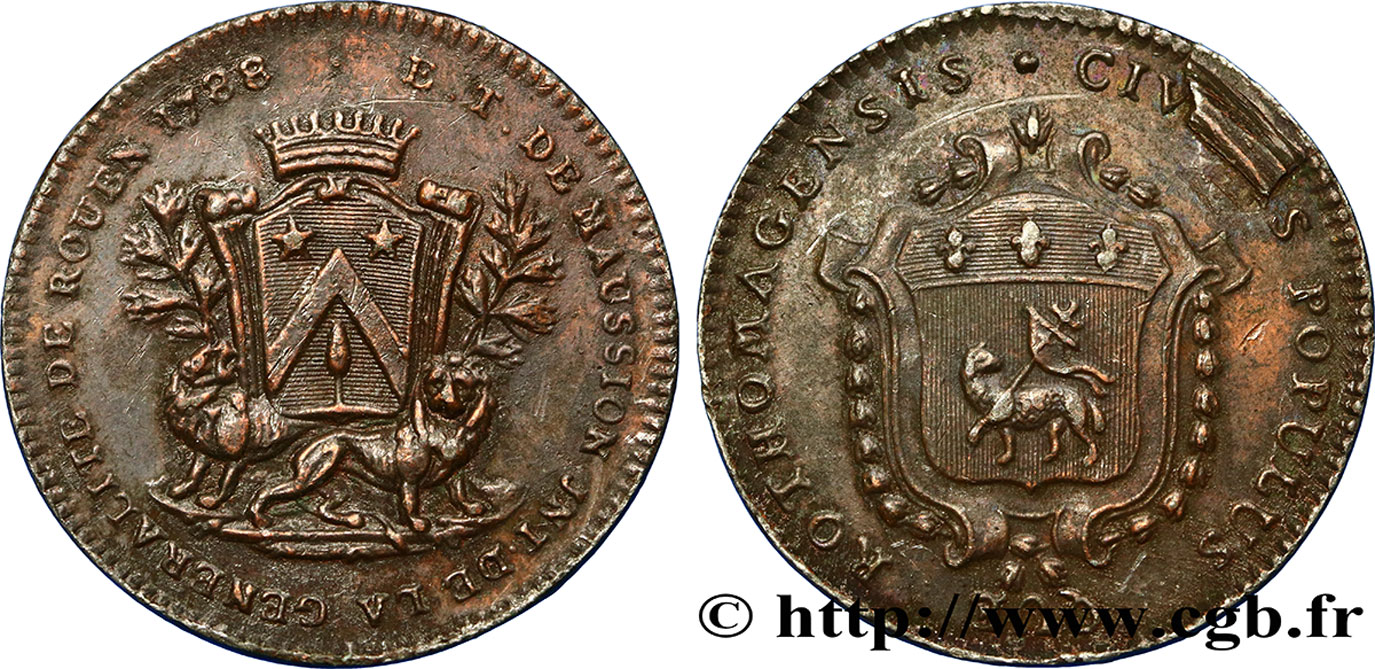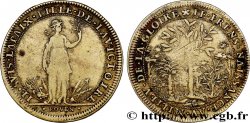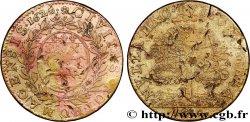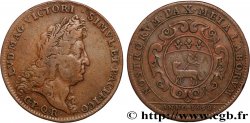E-auction 137-77765 - fjt_014704 - ROUEN (CITY OF...) Etienne Thomas de Maussion, intendant de Rouen, étain bronzé 1788
You must signin and be an approved bidder to bid, LOGIN TO BID. Accounts are subject to approval and the approval process takes place within 48 hours. Do not wait until the day a sale closes to register. Clicking on « bid » constitutes acceptance of the terms of use of cgb.fr private e-auctions.
Bids must be placed in whole Euro amounts only. The sale will start closing at the time stated on the item description; any bids received at the site after the closing time will not be executed. Transmission times may vary and bids could be rejected if you wait until the last second. For further information ckeck the E-auctions F.A.Q.
NO BUYER'S FEE.
NO BUYER'S FEE.
| Estimate : | 75 € |
| Price : | 35 € |
| Maximum bid : | 35 € |
| End of the sale : | 30 November 2015 18:28:30 |
| bidders : | 5 bidders |
Type : Etienne Thomas de Maussion, intendant de Rouen, étain bronzé
Date: 1788
Metal : bronzed tin
Diameter : 30 mm
Orientation dies : 6 h.
Edge : lisse
Catalogue references :
Obverse
Obverse legend : E T DE MAUSSION INT. DE LA GENERALITE DE ROUEN 1788.
Obverse description : Armes d'Etienne Thomas de Maussion.
Reverse
Reverse legend : CIVITAS POPULUSQUE ROTHOMAGENSIS.
Reverse description : Armes de Rouen.
Reverse translation : La ville et le peuple de Rouen.
Commentary
Nous n’avons jamais eu ce jeton, ni en original ni en refrappe, et le fait qu’il soit rarissime est confirmé par le fait qu’un collectionneur, au XIXe siècle, a éprouvé le besoin d’une faire réaliser un moulage en étain bronzé.
Etienne Thomas Maussion était intendant de Rouen et propriétaire du château de Jambville. Il est certainement favorable à la révolution car il va enchérir sur un bien national (qui sera remis en vente dès son procès) attitude qui était à l’époque sans ambiguïté : chacun savait que si le Roi revenait rapidement, ces ventes seraient annulées sans dédommagement.
On trouve sur internet sa lettre d’adieu écrite avant de monter à l’échafaud mais on ne la trouve qu’en anglais... preuve s’il en fallait une que sur ce type de sujet le courage des cultureux français est nul et que la page de la révolution, en France, n’est ni tournée ni prête d’être tournée.
Je me fais donc le plaisir de la citer, elle se trouve à http://www.ebooksread.com/authors-eng/john-goldworth-alger/paris-in-1789-94-farewell-letters-of-victims-of-the-guillotine-egl.shtml
Etienne Thomas Maussion, 43, an ex-judge at Rouen, repelled a mob which tried to pillage his granary. He was accused of visits to Émigrés at Brussels and Rome, but this charge was refuted and abandoned. On the 24th February 1794 he was declared guilty of hoarding grain.
To Citoyenne d'Escayrac, Rue Richelieu, Paris.
Conciergerie, 7 Ventose.
I know, my dear niece, that you were hovering round the Palace
[of Justice] yesterday.
God is my witness that my sole uneasiness was lest you should be present at my condemnation. I know how your affectionate and susceptible heart must have suffered.
Two points only were raised at the trial. First, the Bordier affair. You know what a stranger I was to it. The second was the alleged
emigration. Nobody knows better than you that my return to
France dates back two years before the extreme date fixed by the
decrees.
Nevertheless I do not complain of the condemnation. I
adore the decrees of Providence, and I bless the hand which strikes me. I think I defended myself with simplicity, presence of mind, coolness, and courage. I should, however, have made a fuller defence if I had not behind me my counsel, on whom I counted.
I do not know why, but he also cut it short. Let him be easy,
however ; I have no grudge against him. I know that it was not in
his power to save me. I am sorry that the witnesses who signed
my certificate and who simply testified the truth were destroyed
\sic\.
Ready to appear before the tribunal of the Supreme Being,
I testify it again and fear no contradiction. Having but little
money in prison, I have been unable to pay what I owe to my
counsel. It seems to me that the nation, which takes possession of my property, should undertake the debt. If this raised the slightest difficulty, my family are too honest not to discharge it. My children will not refuse to pay for these things out of the property which should come to them. I recommend you then to pay citizens Chauveau and La Fleutrie.
I leave you my unfortunate children, and trust to your affection for lavishing cares on them. Let them be well educated. It is the best inheritance which can be left them. Inculcate betimes principles which may be their rule of conduct through life. Let the unfortunate example before their eyes early teach them the vanity of human things, so that they may attend to what is more certain and durable.
Etienne Thomas Maussion était intendant de Rouen et propriétaire du château de Jambville. Il est certainement favorable à la révolution car il va enchérir sur un bien national (qui sera remis en vente dès son procès) attitude qui était à l’époque sans ambiguïté : chacun savait que si le Roi revenait rapidement, ces ventes seraient annulées sans dédommagement.
On trouve sur internet sa lettre d’adieu écrite avant de monter à l’échafaud mais on ne la trouve qu’en anglais... preuve s’il en fallait une que sur ce type de sujet le courage des cultureux français est nul et que la page de la révolution, en France, n’est ni tournée ni prête d’être tournée.
Je me fais donc le plaisir de la citer, elle se trouve à http://www.ebooksread.com/authors-eng/john-goldworth-alger/paris-in-1789-94-farewell-letters-of-victims-of-the-guillotine-egl.shtml
Etienne Thomas Maussion, 43, an ex-judge at Rouen, repelled a mob which tried to pillage his granary. He was accused of visits to Émigrés at Brussels and Rome, but this charge was refuted and abandoned. On the 24th February 1794 he was declared guilty of hoarding grain.
To Citoyenne d'Escayrac, Rue Richelieu, Paris.
Conciergerie, 7 Ventose.
I know, my dear niece, that you were hovering round the Palace
[of Justice] yesterday.
God is my witness that my sole uneasiness was lest you should be present at my condemnation. I know how your affectionate and susceptible heart must have suffered.
Two points only were raised at the trial. First, the Bordier affair. You know what a stranger I was to it. The second was the alleged
emigration. Nobody knows better than you that my return to
France dates back two years before the extreme date fixed by the
decrees.
Nevertheless I do not complain of the condemnation. I
adore the decrees of Providence, and I bless the hand which strikes me. I think I defended myself with simplicity, presence of mind, coolness, and courage. I should, however, have made a fuller defence if I had not behind me my counsel, on whom I counted.
I do not know why, but he also cut it short. Let him be easy,
however ; I have no grudge against him. I know that it was not in
his power to save me. I am sorry that the witnesses who signed
my certificate and who simply testified the truth were destroyed
\sic\.
Ready to appear before the tribunal of the Supreme Being,
I testify it again and fear no contradiction. Having but little
money in prison, I have been unable to pay what I owe to my
counsel. It seems to me that the nation, which takes possession of my property, should undertake the debt. If this raised the slightest difficulty, my family are too honest not to discharge it. My children will not refuse to pay for these things out of the property which should come to them. I recommend you then to pay citizens Chauveau and La Fleutrie.
I leave you my unfortunate children, and trust to your affection for lavishing cares on them. Let them be well educated. It is the best inheritance which can be left them. Inculcate betimes principles which may be their rule of conduct through life. Let the unfortunate example before their eyes early teach them the vanity of human things, so that they may attend to what is more certain and durable.








 Report a mistake
Report a mistake Print the page
Print the page Share my selection
Share my selection Ask a question
Ask a question Consign / sell
Consign / sell
 Full data
Full data



